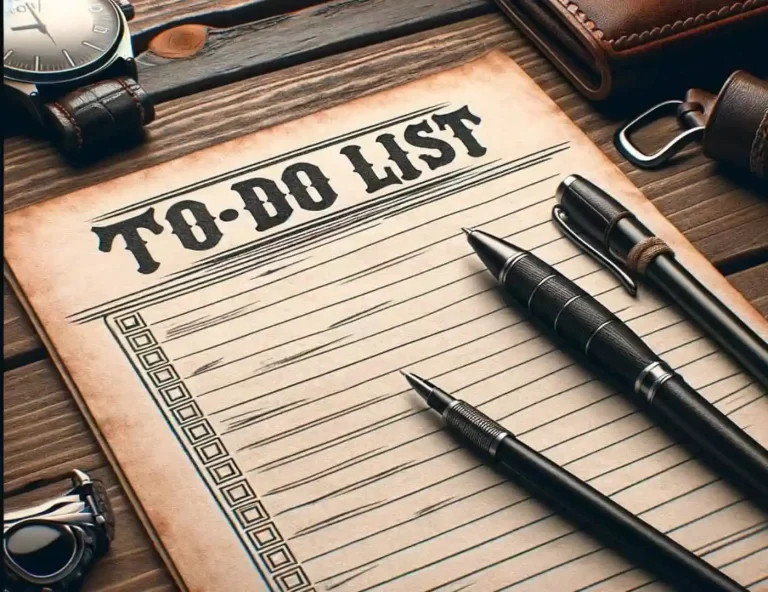The Simple Secret to Getting More Done in Your Week: Write It Down
You wake up already feeling behind. You check your phone before you even sit up—texts, emails, notifications—your day has started without your permission. In your head, you’re juggling everything you said you’d handle today: finish that work project, grab groceries, reply to that one message you’ve been putting off, pay a bill, make a call, fold laundry, show up. And somewhere in there, maybe, breathe. But by noon, the clarity you had in the shower has turned into a fog. You’re putting out fires you didn’t start, reacting to things you didn’t plan, and forgetting things you genuinely meant to do. You’re not lazy. You’re overloaded. And the only thing that seems consistent is how inconsistent everything feels. Deep down, you know you’re capable of more—but your brain feels like a browser with 37 tabs open and not one of them is playing the music you’re hearing.
The Distraction Dilemma
It’s not that you’re doing nothing—it’s that you’re doing everything but the things that matter most. You bounce from app to app, task to task, interruption to interruption. Some of it feels urgent. Some of it is just avoidance in disguise. You’re constantly responding to whatever screams the loudest, and by the end of the day, the quiet, important things get ignored. Again.
Distractions aren’t just around you—they’re inside of you. The mental ping of a reminder you forgot, the low-level stress that follows you from one undone thing to the next, the guilt of seeing the pile grow. It’s exhausting. But it’s familiar. And that’s what makes it so dangerous.
Why Our Brains Keep Dropping the Ball
We think we can remember everything—but our brains weren’t built for storage; they were built for solving. Holding on to every to-do, every conversation, every deadline is like trying to carry all your groceries inside in one trip. Something’s going to fall. When your brain is cluttered, decision fatigue sets in, and even simple choices—like starting a task—feel heavy.
This isn’t a discipline issue. It’s a system issue.
The Game-Changing Power of Writing It Down
Your brain is designed for ideas, not reminders. Writing things down is one of the simplest, most powerful shifts you can make to feel more in control. It’s not about being “type A” or obsessed with productivity—it’s about giving your mind space to breathe. When a task moves from your head to a page or a screen, it stops haunting you. It’s there. It’s captured. It can’t be lost in the chaos.
When you write it, you remember it. When you see it, you do it.
Finding Your Flow: Different Styles That Work
Not everyone thrives on rigid to-do lists. Your system should feel like you—not like someone else’s Pinterest board. Here are a few low-pressure, high-impact ways to make it yours:
- Sticky Note Method: One task, one sticky. Stick them where you can see them.
- Voice Memos: Talk out your to-do’s while driving or walking. Play them back when you’re ready to work.
- Digital Lists: Apps or phone reminders help you schedule and organize tasks in real time.
- Paper Planners: The act of writing with pen and paper can help you stay focused and connected to your goals.
- Calendar Blocking: Assign tasks to actual time slots—what gets scheduled gets done.
Your system should reduce stress, not add to it. If it’s too complicated, it won’t stick. Keep it real, and keep it simple.
How to Stay Motivated and On Track
You don’t need more pressure—you need more wins. Here’s how to build momentum without burning out:
- Start with the top three: Don’t overwhelm your list. Choose the three most important things today.
- Time it: Set a 25-minute timer and knock out one task. Rest. Repeat.
- Create a “done” list: At the end of the day, write what you actually accomplished. It’s often more than you think.
- Attach meaning: Don’t just write “email client”—write “email client to move the project forward.” Purpose fuels action.
- Visual cues: Keep your written goals where you can see them—on your mirror, your lock screen, your fridge.
- Weekly resets: Take 15 minutes on Sunday to reset your list for the week ahead. Reflection turns chaos into clarity.
You’re Not the Problem—Your System Might Be
You’re not forgetful, scattered, or incapable. You just haven’t given yourself the right setup. Writing things down won’t magically fix everything, but it gives your brain room to focus on what matters now instead of everything all at once.
Before You Keep Scrolling
It’s like trying to remember a dream after you’ve woken up. You had it. You knew it. And then it vanished. That’s what happens when you don’t write it down. The thought, the plan, the intention—it slips. And then the regret creeps in.
You don’t need another productivity hack. You just need a place to put your thoughts so they stop slipping through the cracks. Your future self is already thanking you.
The difference between a goal and a result is a pen.
Notes
“Whatever your hand finds to do, do it with all your might.” – Ecclesiastes 9:10







